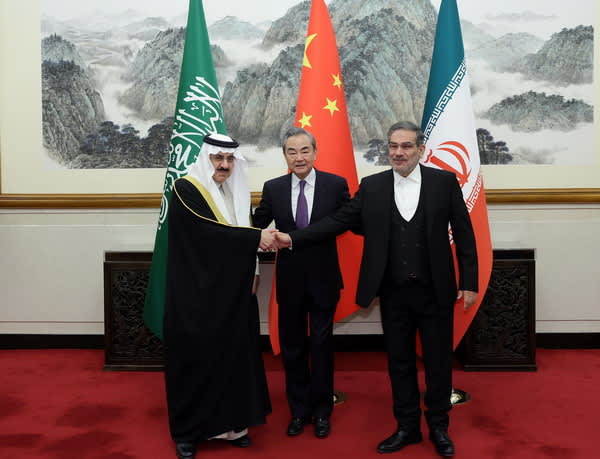
- “When people really stick to the principles of what was agreed upon, I think that can happen very quickly,” Saudi Finance Minister Mohammed Al-Jadaan told CNBC in Riyadh.
- Riyadh and Tehran agreed to resume diplomatic relations and reopen embassies in the two countries following Chinese-led negotiations in Beijing that culminated on March 10.
- Some observers question whether the countries — Iran in particular — will abide by the mutual pledges made in the diplomatic agreement, which is yet to be seen.
Saudi Finance Minister Mohammed Al-Jadaan said on Wednesday that Saudi Arabia may soon invest in its longtime regional foe Iran after a breakthrough agreement reached between the two countries to restore diplomatic relations.
Asked by Hadley Gamble on CNBC in Riyadh how long the world might see the wealthy Saudi kingdom make major investments in Iran and vice versa, Al-Jadaan replied: “I would say very quickly.”
“When people really stick to the principles of what was agreed upon, I think that can happen very quickly. Our goal, and I think our leadership has made that very clear previously, is to have a stable region, that is, able to provide for its people, and to thrive,” the minister said. There’s no reason why that wouldn’t happen.”
Riyadh and Tehran agreed to resume diplomatic relations and reopen embassies in the two countries following Chinese-led negotiations in Beijing that culminated on March 10.
Senior Iranian security official Ali Shamkhani (R), Chinese Foreign Minister Wang Yi (C) and Musaed Al-Aiban, the Saudi National Security Adviser pose for a photo after Iran and Saudi Arabia agreed to resume bilateral diplomatic relations after several days of deliberations. Between senior security officials from the two countries in Beijing, China on March 10, 2023.
Bulletin of the Chinese Ministry of Foreign Affairs | Anadolu Agency | Getty Images
They also pledged to affirm “respect for the sovereignty of states and non-interference in the internal affairs of states”, which is a major step After years of mutual hostility, aggression and espionage between the two countries.
Some regional analysts and Western policymakers question whether countries – Iran in particular – will stick to these pledges, which is yet to be seen. The two powers in the Middle East remain ideologically at odds, and neither country’s suspicion of the other will not disappear overnight.
However, the Saudi Finance Minister sounded optimistic.
“Iran is our neighbor, and it has been and will remain so for hundreds of years,” Al-Jadaan said. “So I don’t see any issue that would prevent the normalization of the relationship, mutual investments and so on, as long as we stick to the agreements – you know, we respect sovereign rights, we don’t interfere in other people’s affairs, we respect the UN agreements and others, so I don’t see any obstacles.” actually “.
The countries also agreed that previous cooperation agreements – namely the “Agreement on Security Cooperation” from 2001 and the “General Agreement on Cooperation” from 1998 covering trade, economy, sports, technology, science, culture, sports and youth – are being revived.
The Saudi statement announcing the deal said, “The three countries expressed their keenness to make every effort to promote regional and international peace and security,” referring to themselves and to Iran and China.
The two major oil producers face starkly different economic realities: Saudi Arabia, investing internationally and launching trillions of dollars in mega projects as part of the kingdom’s Vision 2030 plan to diversify away from oil; and Iran, whose economy and currency have soared under years of Western sanctions, government corruption, and economic mismanagement.
Investment from Saudi Arabia is likely to be a huge boon for Iran’s battered economy, although it is unclear whether existing US sanctions on Iran will apply to financial activity between the two countries.
“I think, without going into detail, I think we realize… clearly that in order to be able to focus on your economic development and focus on providing for the people of your country, you need stability, and they need stability.” – said Al-Jadaan. “And I think there are a lot of opportunities in Iran, and we offer a lot of opportunity for them, as long as the goodwill continues.”
Iran and Saudi Arabia have long accused each other of destabilizing the region and viewed each other as serious security threats, often on opposite sides of regional conflicts such as those in Yemen, Lebanon and Syria. Both Riyadh and Washington accuse Tehran of being behind several attacks on Saudi ships, land and energy infrastructure in the past few years.
Saudi Arabia severed diplomatic relations with Iran in 2016, after Iranian protesters stormed the Saudi embassy in Tehran in response to the Saudi authorities’ execution of 47 dissidents, including a prominent Shiite cleric.




More Stories
Journalists convicted in Hong Kong sedition case
Stand News: Hong Kong journalists convicted of sedition in case critics say highlights erosion of press freedom
Shark decapitates teen off Jamaica coast